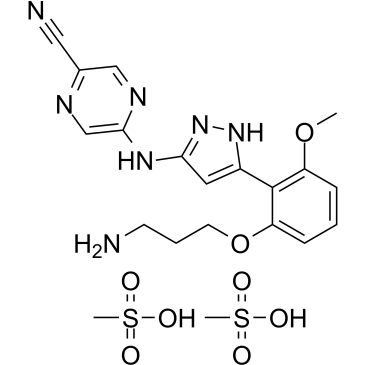1234015-58-7
| Name | Prexasertib dimesylate |
|---|
| Description | Prexasertib dimesylate (LY2606368 dimesylate) is a selective, ATP-competitive second-generation checkpoint kinase 1 (CHK1) inhibitor with a Ki of 0.9 nM and an IC50 of <1 nM. Prexasertib dimesylate inhibits CHK2 (IC50=8 nM) and RSK1 (IC50=9 nM). Prexasertib dimesylate causes double-stranded DNA breakage and replication catastrophe resulting in apoptosis. Prexasertib dimesylate shows potent anti-tumor activity[1][2]. |
|---|---|
| Related Catalog | |
| Target |
Chk1:0.9 nM (Ki) Chk1:<1 nM (IC50) Chk2:8 nM (IC50) |
| In Vitro | Prexasertib dimesylate (LY2606368 dimesylate) inhibits MELK (IC50=38 nM), SIK (IC50=42 nM), BRSK2 (IC50=48 nM), ARK5 (IC50=64 nM). Prexasertib dimesylate requires CDC25A and CDK2 to cause DNA damage[1]. Prexasertib dimesylate (33, 100 nM; for 7 hours) results in DNA damage during S-phase in HeLa cells[1]. Prexasertib dimesylate (8-250 nM; pre-treated for 15 minutes) inhibits CHK1 autophosphorylation (S296) and CHK2 autophosphorylation (S516) in HT-29 cells[1]. Prexasertib dimesylate (4 nM; 24 hours) results in a large shift in cell-cycle populations from G1 and G2-M to S-phase with an accompanied induction of H2AX phosphorylation in U-2 OS cells[1]. Prexasertib dimesylate (33 nM; for 12 hours) causes chromosomal fragmentation in HeLa cells. Prexasertib dimesylate (100 nM; 0.5 to 9 hours) induces replication stress and depletes the pool of available RPA2 for binding to DNA[1]. Cell Cycle Analysis[1] Cell Line: HeLa cells Concentration: 33, 100 nM Incubation Time: For 7 hours Result: Had an IC50 of 37 nM and resulted in the G2-M population received DNA damage during S-phase but continued to progress through the cell cycle into an early mitosis. Western Blot Analysis[1] Cell Line: HT-29 cells Concentration: 8, 16, 31, 63, 125, 250 nM Incubation Time: Pre-treated for 15 minutes Result: Inhibited CHK1 autophosphorylation (S296) and CHK2 autophosphorylation (S516) (IC50 of less than 31 nM) in HT-29 cells. |
| In Vivo | Prexasertib dimesylate (LY2606368 dimesylate; 1-10 mg/kg; SC; twice daily for 3 days, rest 4 days; for three cycles) causes growth inhibition in tumor xenografts[1]. Prexasertib dimesylate (15 mg/kg; SC) causes CHK1 inhibition in the blood and the phosphorylation of both H2AX (S139) and RPA2 (S4/S8)[1]. Animal Model: Female CD-1 nu-/nu- mice (26-28 g) with Calu-6 cells[1] Dosage: 1, 3.3, or 10 mg/kg Administration: SC; twice daily for 3 days, rest 4 days; for three cycles Result: Caused statistically significant tumor growth inhibition (up to 72.3%). Animal Model: Female CD-1 nu-/nu- mice (26-28 g) with Calu-6 cells[1] Dosage: 15 mg/kg (Pharmacokinetic Analysis) Administration: SC (200 μL) Result: CHK1 was 7 ng/mL at 12 hours and 3 ng/mL by 24 hours in plasma exposures. Phosphorylation of both H2AX (S139) and RPA2 (S4/S8) was detectable at 4 hours, showing the rapid occurrence of DNA damage. |
| References |
| Molecular Formula | C20H27N7O8S2 |
|---|---|
| Molecular Weight | 557.60 |
